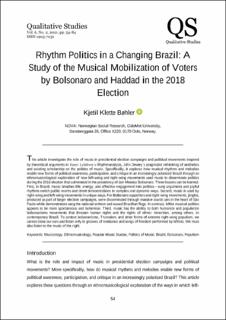| dc.contributor.author | Bøhler, Kjetil Klette | |
| dc.coverage.spatial | Brazil | en_US |
| dc.date.accessioned | 2022-03-14T13:59:58Z | |
| dc.date.available | 2022-03-14T13:59:58Z | |
| dc.date.created | 2021-09-03T15:26:06Z | |
| dc.date.issued | 2021-06-09 | |
| dc.identifier.issn | 1903-7031 | |
| dc.identifier.uri | https://hdl.handle.net/11250/2985101 | |
| dc.description.abstract | This article investigates the role of music in presidential election campaigns and political movements inspired by theoretical arguments in Henri Lefebvre’s Rhythmanalysis, John Dewey´s pragmatist rethinking of aesthetics and existing scholarship on the politics of music. Specifically, it explores how musical rhythms and melodies enable new forms of political awareness, participation, and critique in an increasingly polarized Brazil through an ethnomusicological exploration of how left-wing and right-wing movements used music to disseminate politics during the 2018 election that culminated in the presidency of Jair Messias Bolsonaro. Three lessons can be learned. First, in Brazil, music breathes life, energy, and affective engagement into politics—sung arguments and joyful rhythms enrich public events and street demonstrations in complex and dynamic ways. Second, music is used by right-wing and left-wing movements in unique ways. For Bolsonaro supporters and right-wing movements, jingles, produced as part of larger election campaigns, were disseminated through massive sound cars in the heart of São Paulo while demonstrators sang the national anthem and waved Brazilian flags. In contrast, leftist musical politics appears to be more spontaneous and bohemian. Third, music has the ability to both humanize and popularize bolsonarismo movements that threaten human rights and the rights of ethnic minorities, among others, in contemporary Brazil. To contest bolsonarismo, Trumpism, and other forms of extreme right-wing populism, we cannot close our ears and listen only to grooves of resistance and songs of freedom performed by leftists. We must also listen to the music of the right. | en_US |
| dc.description.sponsorship | Most of the research related to this article was financed by the project “The Politics of Music in a Changing Latin-America: Cuba and Brazil”, financed by the Norwegian Research Council, with project number 415017. A smaller part of the research related to this article was financed by the project “Algorithmic Governance and Cultures of Policing: Comparative Perspectives from Norway, India, Brazil, Russia, and South Africa (AGOPOL)”, financed by the Norwegian Research Council, with project number 202340. | en_US |
| dc.language.iso | eng | en_US |
| dc.publisher | Aalborg University | en_US |
| dc.relation.ispartofseries | Qualitative Studies;Vol. 6, No. 2, 2021 | |
| dc.subject | Musicology | en_US |
| dc.subject | Ethnomusicology | en_US |
| dc.subject | Popular music studies | en_US |
| dc.subject | Politics of Music | en_US |
| dc.subject | Bolsonaro, Jair | en_US |
| dc.subject | Populism | en_US |
| dc.title | Rhythm Politics in a Changing Brazil: A Study of the Musical Mobilization of Voters by Bolsonaro and Haddad in the 2018 Election. | en_US |
| dc.type | Peer reviewed | en_US |
| dc.type | Journal article | en_US |
| dc.description.version | publishedVersion | en_US |
| dc.rights.holder | Copyright belongs to the author and Qualitative Studies | en_US |
| cristin.ispublished | true | |
| cristin.fulltext | original | |
| cristin.qualitycode | 1 | |
| dc.identifier.doi | https://doi.org/10.7146/qs.v6i2.127312 | |
| dc.identifier.cristin | 1931217 | |
| dc.source.journal | Qualitative Studies | en_US |
| dc.source.volume | 6 | en_US |
| dc.source.issue | 2 | en_US |
| dc.source.pagenumber | 54-84 | en_US |
| dc.relation.project | Norges forskningsråd: 313626 | en_US |
| dc.relation.project | Norges forskningsråd: 415017 | en_US |
| dc.relation.project | Norges forskningsråd: 202340 | en_US |
